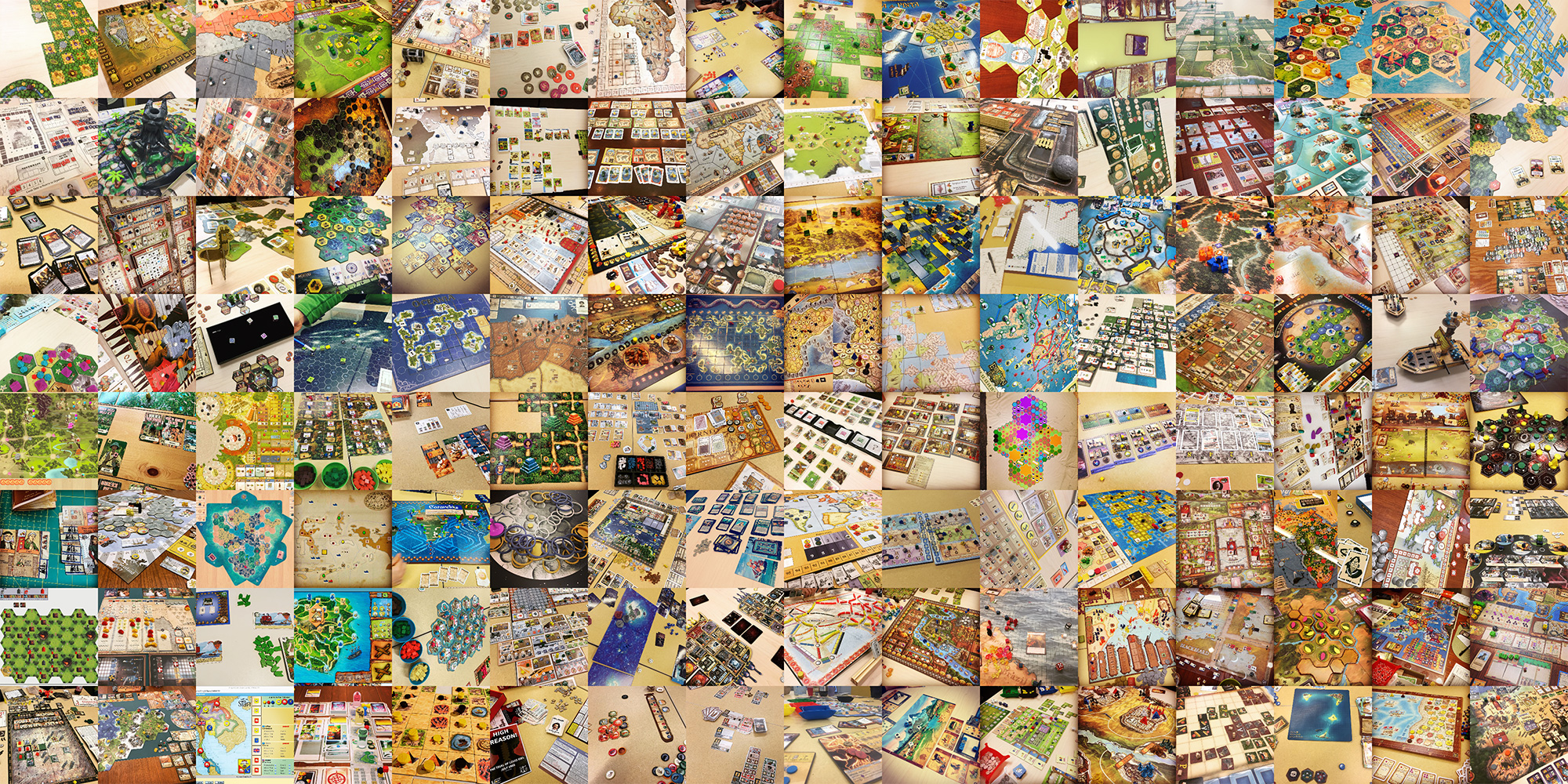Games & Colonialism
2017- : Mikael Jakobsson (PI)
Projects
Playing Oppression
Forthcoming book by Professor Mary Flanagan and Mikael Jakobsson, to be published by MIT Press.
What does the history of colonialism-themed board games look like, and what can it tell us about the situation today? What does it mean to present these historical moments in such a lavish form and then let these artifacts serve as centerpieces to gather around for social interaction at board game cafes, meetups, and conventions? By bringing in the history and materiality of the playing activity into critical readings of these games, the authors offer a new perspective on the narratives that are being simulated and reenacted and the casting of player into colonialist roles.
Orderly Adventures
In service to the forthcoming book, Playing Oppression, we have been playing various board games which use colonialist themes. As of April 2019, we have played over 150 titles and our collection has grown to over 250 board games, card games, party games, and war games that depict colonialist themes. The title for this project comes from an idea that euro games offer some of the excitement of the periods they depict (sails, discovery, heroism, fame, and fortune) but not too much through their gameplay and physical pieces, by hiding the bloody end of the sword and only engaging with foreign cultures as passive representations that can be neatly sorted into a box between plays.
Creating Counter-Colonial Games
As part of our research, we have engaged in workshops with people from the lands in which these colonial games take place, as a means to unpack the colonialist endeavor and place it in context to games’ representation of these cultures and issues of importance to modern members of these cultures. Workshops follow action research and participatory design methodologies. The focus of these workshops is to encourage participants game design practices, provide methods they can take away for use in their own work, and to inform our understanding of issues resulting from colonialist practices.
Workshops
Botero, C., Eberhardt, R., Figueroa, P., Jakobsson, M., Rodriguez, A. “Video Games for Social Impact” (2018). Universidad de los Andes. Conducted July 2018.
One-month game development class developed in coordination with Pablo Figueroa (Associate Professor, Universidad de los Andes, IMAGINE Research Group) and Claudia Botero (Dean, School of Law, Universidad de los Andes). Students came from various disciplines, including Computer Science, Media Arts, Information Technology, Economics, and History. Workshop included sessions on rights provided by the Colombian constitution, representations of Colombia in games, and game design methodology. Students created playable game prototypes in paper and as digital products.
Game Prototypes
Fernando Quiroga, D. & Lucía Agudelo, M. “I got the power”
This is a game that helps to understand the way in which a social leader emerges within a community in Colombia. The idea is to allow anyone to interact with each proposed scenario and make decisions that help the community. The main motivation is to teach about the importance of social leaders in Colombia. Additionally the game teaches about some of the risks that social leaders can suffer. And this is a subject that should not be taken lightly and more in these post-conflict moments in which Colombia lives.
It is Our Turn is a RPG style game. It consists of a team of friends with very varied race, gender and sexual identities. This group of friends must fight against different enemies who have different prejudices.
González, F., Barrera, S., Albornoz, J. López, H. “La Guerra del Centavo”
The project “La Guerra del Centavo” seeks to create a game that puts the user in the place of a public service bus driver of the old transportation system in Bogotá. In this system, drivers receive money according to the number of passengers they collect, which causes problems for everyone involved and causes drivers to make decisions about how to drive in order to pick up a significant number of passengers while they meet the traffic rules. On occasion, service users blame drivers for system problems, but in reality they have limited options to work with.
Ramírez, S., Alejandro Silva Ariza, J., Zambrano Votto, C., Bautista Cabrera, D. “Una de Dos”
A single player video game that simulates the decisions that a Colombian rural family must face in their daily lives. Every decision will affect the economic resources of your family and their well-being.
Eberhardt, R., Jakobsson, M., Rodriguez, A. (2018). “Maria – Conceptualization Workshop.” Neeuko, Universidad del Sagrado Corazón. Conducted 14 July 2018.
One day workshop with invited participants, conducted at the Neeuko Centro de Innovación Colaborativa. Sessions focused on conceptualization of ideas around issues of importance to the participants, largely focused on greater issues in Puerto Rico amplified by damage created by Hurricane Maria.

-
- Participants:
- Gretchen Asmar
- Javier De Jesus
- Adriana Garcia
- Tania Gonzales
- Celete Hernandez
- Juan Marquez
- Lenny Mendez
- Diva Mockford
- Joey A.Villalobos
Eberhardt, R., Jakobsson, M., Rodriguez, A. (2018). “Maria – Design Workshop.” Massachusetts Institute of Technology. Conducted 26-27 July 2018.
Ideas from the conceptualization workshop were brought to MIT as inspiration and background for design exercises. Participants were MIT students, community members, and invited tabletop game designers. Sessions included overview of Puerto Rican context, including social, political, and cultural issues. These prototypes will next be brought to Puerto Rico (and prior participants) for play testing, feedback, and further design iteration.

-
- Participants:
- Sydney Engelstein
- Caitlin Feeley
- Eko Nugroho
- Sofia Leung
- Samuel Liberty
- Tomer Perry
- Max Seidman
- Danniely Staback
- Philip Tan
- Sara Verrilli
Game Prototypes

Engelstein, S., Jakobsson, M., Perry, T., & Verrilli, S. “Promesa”
Based on the US federal law, Puerto Rico Oversight, Management, and Economic Stability Act (PROMESA) in place for managing the Puerto Rican government’s debt, “Promesa” has players work together to push a ‘raft’ with debt on it back to Washington, DC. Players have to balance island needs like food, social services, health care and education while battling off enough of the debt so the “raft” can be pushed without any cubes falling off (this is more of a risk reward element than a dexterity mechanic).

Eberhardt, R., Feeley, C., Leung, S., & Seidman, M. “Untitled Policy Game”
A game about the local decisions that can be made in Puerto Rico, in which players are tasked to make decisions that are best for the island, but are ultimately restricted by the resources and agency that they have. Each player has a role that gives them access to two piles of resources: a teacher might have access to social capital and community cards, a housing justice advocate might access government and social capital, a zoning board officer might get government and economy. In the center are random policies that have requirements – if all of the requirements are met based on the cards played in a round, the policy is passed and whatever consequences that policy enacts change the state of the board.
Eberhardt, R., Flanagan, M., & Jakobsson, M. (2019). “IAP: Board Games and Counter Colonialism in the Americas.” Massachusetts Institute of Technology. Conducted 16-17 January 2019.
Two-day class held during MIT’s Independent Activities Period as a non-credit activity. From the course description:
What messages and ideologies are embedded in the games we play, why does it matter, and how can we do better? In this two day workshop, we will look at contemporary board games with colonialist themes set in the Americas. We will discuss and play the games using a critical postcolonial lens in order to see how we can understand the function of these cultural artifacts in a greater political context. We will look at problematic issues which are prevalent in current commercial games, but we will also look at examples of counter-colonialist games.
The first day will focus on games set in Latin America, and the second day Anglo-America. We will discuss the rhetorical power of messaging through games and investigate both its negative and positive potential. Participants will spend a substantial part of the workshop playing and analyzing games. We do this since the object of analysis often is designed to transcend a meta-analytical mindset while having interactive properties which require authentic engagement through play. In other words, participants will have fun playing games while maintaining a critical analytical frame of mind.
Presentations
Eberhardt, R. and Jakobsson, M. “Board Game Design Day: Better Board Games Through Cultural Engagement.” Game Developers Conference 2019. San Francisco, CA.
Why have hundreds of colonial-themed board games been published during the last two decades? And why are more and more of these games being released every year? In this talk, MIT’s Mikael Jakobsson and Rik Eberhardt will present their findings from a year of board game design workshops in Bogot, San Juan, and Bangor with professional designers, students, and representatives of locals and indigenous peoples of the different areas.The purpose of the workshops was to learn what people who live in places that so often are represented in board games actually care about, and create game prototypes based on these themes. Mikael and Rik wanted to make counterexamples to the plethora of games that focus on the European colonialist time period and often represents the indigenous people in a very passive way, or not at all. In this talk, they’ll focus on what modern board game developers can learn from their study, showing that there are great untapped opportunities connected to the use of contemporary themes and ascribing greater agency and ownership to representations of local cultures.
In The Press
Eberhardt, R. and Jakobsson, M. “Ludology Episode 197 – Empires Up in Arms.” from Engelstein, G. and Hova, G. Ludology. podcast. Published 7.April.2019. http://ludology.libsyn.com
Gil and Geoff welcome Mikael Jakobsson and Rick Eberhardt from the MIT Game Lab to discuss their research into colonial themes in board games, and the game design workshops they run in former colonial countries.
Funding provided by
MIT International Science and Technology Initiative (MISTI)
MIT Scheller Teacher Education Program
Universidad de los Andes







